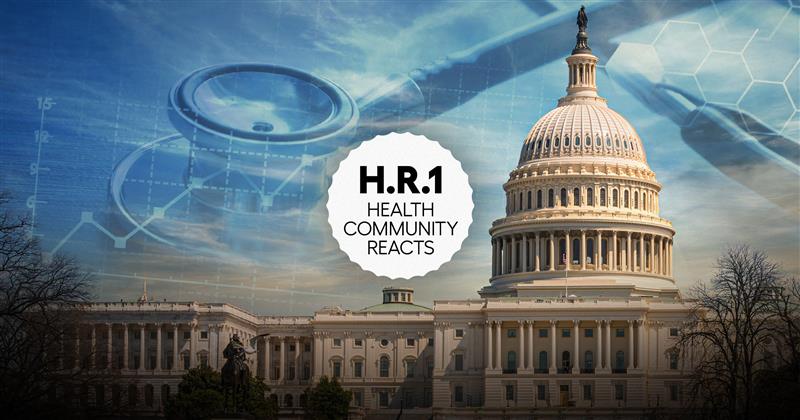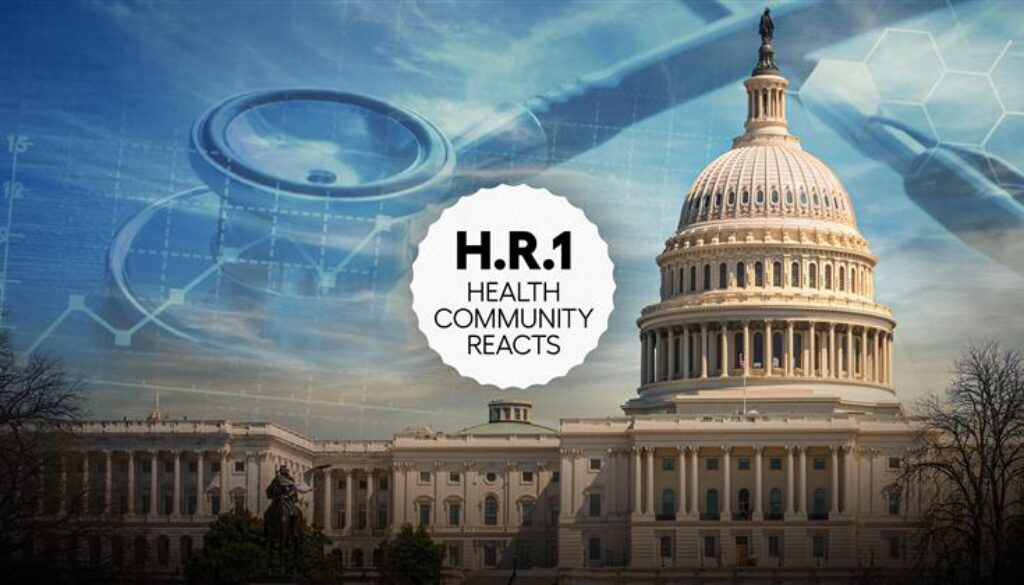Health community reacts to Senate bill impacts on health care

The Senate-passed version of what is called the “big beautiful bill” will have an outsized impact on health care, removing millions from the Medicaid rolls, tightening requirements for Affordable Care Act eligibility and impacting the finances of health care facilities in rural and low-income communities.
Reaction from various factions of the health care community continued the day after Senate passed the bill in a 51-50 vote with Vice President JD Vance casting the tie-breaking vote.
The House passed its own version of the bill in May and is expected to consider the Senate’s version today. The bill cuts approximately $930 billion from Medicaid over the next decade, risking coverage loss for roughly 11.8 million adults by 2034. In addition, the bill did not include an extension of the enhanced tax credits that allow people to purchase coverage on the Affordable Care Act exchanges. Those enhanced tax credits will expire at the end of this year unless Congress acts.
AHIP: Not too late to change course
AHIP, the trade association representing U.S. health insurers, issued a statement saying that the bill “could result in the biggest rollback in health care coverage in the country’s history.”
The statement further said the combined impact of the policies in the bill “will destabilize state Medicaid programs and undermine countless local health care systems.
“Due to new red tape and barriers to enrollment and re-enrollment, people losing eligibility for Medicaid will find an individual market with less choice and higher premiums. The potential expiration of the current health care tax credits later this year would compound the disruption.
“Taken together, these policies could result in the biggest rollback in health care coverage in the country’s history. That would mean millions of American families lose affordable access to primary care and pharmacies. The emergency room – the costliest and least coordinated site of care – would become the front door of the health care system for millions of people. The bulk of these costs would simply shift to uncompensated care payments and to those who are insured.”
AHIP called for Congress “to change course and keep coverage and care stable and affordable for low-income people and working families.”
Health care facilities could be harmed
KFF, an independent source for health policy research, polling and news, reported that the Senate plan would tear federal spending on Medicaid and ACA marketplaces by about $1 billion over the next 10 years, a move that would harm the finances of hospitals, nursing homes and community health centers. Such facilities would have to absorb more of the cost of treating uninsured people — and may force them to reduce services and employees, as well as close facilities.
The GOP’s plan would curtail a practice, known as provider taxes, that nearly every state has used for decades to increase Medicaid payments to hospitals, nursing homes, and other providers and to private managed-care companies.
States often use the federal money generated through the taxes to pay the institutions more than Medicaid would otherwise pay. (Medicaid generally pays the lowest fees for care, compared with Medicare, the program for people over 65 and some with disabilities, and private insurance.)
Hospitals and nursing homes say they use these extra Medicaid dollars to expand or add new services and improve care for all patients.
Republican senators tacked a $50 billion fund onto their version of the bill to cushion the blow to rural hospitals.
ACA reenrollment affected
Those who have health insurance through the ACA marketplace would find it more difficult to enroll in and retain their plans.
Marketplace policyholders would be required to update their income, immigration status, and other information each year, rather than be allowed to automatically reenroll — something more than 10 million people did this year. They would also have less time to enroll; the bill shortens the annual open enrollment period by about a month.
The CEO of one agents association said these requirements could have an impact on low-income Americans who rely on the ACA for coverage and the agents who work with them to keep them covered. The removal of automatic reenrollment could lead to loss of coverage, said Ronnell Nolan, president and CEO of Health Agents for America.
“Your agent has to touch you during open enrollment, or you have to touch the plan or policy to remain in coverage,” Nolan told InsuranceNewsNet. “You can’t just automatically be reenrolled. Our understanding is that was put in the bill to keep those who are in the country illegally from getting coverage. But this Senate bill went a bit further.”
Senators ‘should be ashamed’
“Every senator who voted in support of this big, bad budget bill should be ashamed of both the process and the policy,” said Anthony Wright, executive director of Families USA, a health care consumer advocacy organization.
“All Americans should remember this vote with horror about what the Senate is willing to do to our health coverage, our costs, and our care, all to give even bigger tax breaks to billionaires and big corporations. Senators voted to push and price millions of Americans out of health coverage, to raise our costs, and to upend the health system on which we all rely. While the Senate managed to drag this disastrous bill across the finish line with backroom bullying and unseemly side deals for states, this ugly process produced an even uglier bill, historically unpopular with voters on both sides of the aisle—and for good reason.
“This bill betrays Americans who voted for affordability, not for a budget that would raise health costs in both public and private coverage. This bill betrays the promises made by the President and by Senators to not touch Medicaid or slash away at our health care system and social safety net.”
© Entire contents copyright 2025 by InsuranceNewsNet.com Inc. All rights reserved. No part of this article may be reprinted without the expressed written consent from InsuranceNewsNet.com.
The post Health community reacts to Senate bill impacts on health care appeared first on Insurance News | InsuranceNewsNet.





